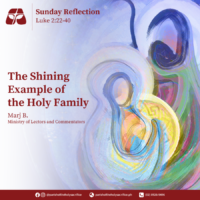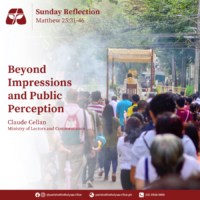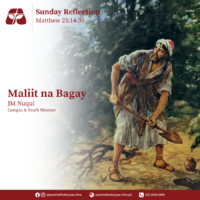Sunday Gospel Reflection
17th Sunday in Ordinary Time
John 6:1-15
Signs and Wonders
T. Rex Paras
Ministry of Lectors and Commentators
The Gospel today is one of the well-known accounts in the Bible particularly in the New Testament. It is the story about the multiplication of the loaves and the fish (John 6:1-15). With only five loaves and two fish, Jesus was able to feed the five thousand. Much has been said about this narrative. For one, it has been used to illustrate God’s generosity which is very accurately summed up in today’s Responsorial Psalm, “The hand of the Lord feeds us; he answers all our needs.” The story has also been retold in a way that emphasizes the importance of sharing one’s blessings. Many lessons have been drawn from this passage ranging from the assurance that God will provide all our needs and make every grace abundant for us to the call to sow bountifully and be cheerful givers. (Cf. 2 Corinthians 6-8) What else is there left to say?
When I reread the Gospel in preparation for writing this reflection, I was struck by the word ‘sign/s’ which was used twice in the reading. At the beginning of the story, “[a] large crowd followed [Jesus], because they saw the signs he was performing on the sick.” (Jn 6:2) Then, towards the end, “[w]hen the people saw the sign he had done,” they extolled him as “the Prophet, the one who is to come into the world.” (Jn 6:14)
Signs are very practical. They give us direction. They elicit specific behavior or actions. The red on the traffic light makes us stop, or at least it should, while the green tells us to go. Similarly, the signs mentioned in the reading brought about a specific course of action from the people surrounding Jesus.
When “they saw the signs he was performing on the sick,” i.e., healing even those afflicted with long-term illnesses (Cf. Jn 5:1-18 or the “Cure on a Sabbath” of a man “who had been ill for thirty-eight years”), they decided to follow him. In other words, the miracles—the signs—that Jesus performed on the sick prompted the people to follow him. However, today’s passage is silent as to what the people wanted to accomplish in following Jesus. After witnessing the signs, did they follow him to share in his mission of bringing glad tidings to the poor, liberty to captives, healing to the sick and freedom to the oppressed? (Cf. Luke 4:18) Or did they follow him as usyoseros merely wanting to know what sort of wonders he would do next? Worse, did they follow him to gather evidence which they could use in plotting against him?
After Jesus fed the five thousand with only five loaves and two fish, the people were so moved that they exclaimed, “This is truly the Prophet, the one who is to come into the world.” (Jn 6:14) The multiplication of the loaves and the fish—another sign—generated a specific response from the people, this time an acknowledgment of the mighty deed of Jesus. That the people needed a sign to recognize the Lord’s greatness is reminiscent of the encounter between Jesus and Thomas after the Resurrection. Recall that when Jesus first appeared to the disciples after rising from the dead, Thomas was not around. When the others told Thomas that they have seen the Lord, Thomas said that unless he saw the mark of the nails in Jesus’ hands and put his finger into the nailmarks and put his hand into Jesus’ side, he would not believe. (Jn 20:24-25) Thomas wanted a sign! And when Thomas finally got his sign, he made the now-immortalized declaration of faith, “My Lord and my God!” (Jn 20:28)
While Jesus admonished Thomas for believing only after seeing a sign, I do not think that it is an indictment against the usefulness of signs. True, blessed are those who have not seen a sign yet they believed. (Cf. Jn 20:29) However, believing does not come easy for many of us. In fact, even the disciples wavered in their faith. (e.g., Matthew 14:22-33 or “The Walking on the Water” when Jesus even referred to Peter as “you of little faith”) Many of us look for signs, and when they do come along, may they serve, like in the case of Thomas, as impetus for a stronger and livelier faith. What is important is how we act on the signs that we see, on the wonders that we witness.
A blessed Sunday to one and all and prayerful thoughts for our grandparents and the elderly as we celebrate the first-ever World Day for Grandparents and the Elderly
——————————————–
Artwork:
Die Speisung der Fünftausend by Hendrick de Clerck (1570-1630)


